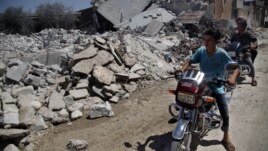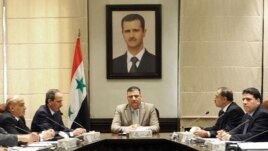Syrian Government Assault Targets Rebels i
August 08, 2012
Syrian government
jets and helicopters bombed targets in the besieged northern city of
Aleppo Wednesday as tanks launched a ground assault on the rebel-held
district of Salaheddin.
There were reports of fierce battles with Syrian state television saying rebels were being overrun. Leaders of the rebel Free Syrian Army denied their forces were retreating.
Reports from some foreign journalists in the city, however, say some rebel forces had pulled back from their positions in Salaheddin, while others continue to hold their ground. One rebel commander near the city was quoted as saying that his men were running short of ammunition.
Heavy destruction
Arab satellite channels showed several buildings in Aleppo that had collapsed after being bombed by fighter jets. Amateur video also showed rocket and bullet-pocked concrete facades and burnt-out flats destroyed by field artillery.
Earlier on Wednesday, the opposition Syrian Observatory for Human Rights said the fighting in Aleppo was the most violent since rebels first claimed control of part of the city.
Rebels near Aleppo's iconic historic citadel, in the center of the city, continued to attack the fortress as government soldiers fended them off. The rebels claimed they had captured part of the fortress, but the report could not be verified.
Rights group Amnesty International released satellite images of Aleppo and the surrounding region this week, showing what it says are signs of increased use of heavy weapons, including near residential areas.
The group says the images raise "urgent concerns" about an impending assault on the city. It warned both rebels and government forces that attacks against civilians will be monitored.
"Amnesty International is sending a clear message to both sides in the fighting: Any attacks against civilians will be clearly documented so that those responsible can be held accountable," Christoph Koettl, emergency response manager for Amnesty International USA, said in the statement.
Photo Gallery: Latest images from Syria
Fighting spreads
Witnesses reported heavy government shelling in other flashpoint towns and cities including Homs and nearby towns. Witnesses also reported heavy shelling amid a government siege of the desert-oasis town of Deir Ezzor.
Analyst Nadim Shehadi of Chatham House in London said that despite the media focus on the Syrian government's offensive in Aleppo, other parts of the country are being more heavily attacked.
"I don't see that the battle for Aleppo has really started yet," he said "They may just be encircling the city and doing skirmishes here and there.
"If you look at the casualty figures, they are more in Damascus and Rastan and Deir Ezzor and in other places than in Aleppo," he said "So the focus is now on Aleppo, but there's a lot happening elsewhere, military-wise."
Shehadi said that the government may be counting on rebel forces to alienate the civilian population of Aleppo, causing them to lose support before a Syrian forces launch a full-scale invasion.
Iranian conference
In Tehran, Iranian Foreign Minister Ali Akbar Salehi said that a conference will take place in Tehran on Thursday aimed at promoting dialogue between the Syrian opposition and the Assad government. It was unclear who would attend the conference.
Salehi visited Turkey Tuesday in a bid to seek Ankara's help in releasing 48 Iranians held by the Free Syrian Army. He said on Wednesday that some of the Iranians are retired members of the Revolutionary Guards and the army. He said they were in Damascus on a religious pilgrimage and did not have any current military connection.
But the Wall Street Journal reported Wednesday that the men had booked their trip through a Revolutionary Guards tour group. The rebel Free Syrian Army said the Iranians were on a "reconnaissance mission."
'Worst case scenario'
Meanwhile, Jordan's information minister confirmed that former Syrian Prime Minister Riyad Hijab, who defected Monday, entered the country.
Mr. Hijab's spokesman said that he made it across the border late Tuesday, despite initial reports that he entered on Monday.
Jordan's King Abdullah says Syrian President Bashar al-Assad could try to create a stronghold for his minority Alawite sect if he is unable to keep control of the entire country.
In an interview with U.S. broadcaster CBS, the king said such an event would create major problems for the nation's neighbors.
"That would be, I think for us, the worst case scenario because that means then the breakup of greater Syria," said King Abdullah. "And that means that everybody starts land grabbing, which makes no sense to me. If Syria then implodes on itself that would create problems that would take us decades to come back from."
The 17-month uprising against President Assad's rule is driven primarily by Sunni Muslims who make up the majority of Syria's population. Only about 10 percent of Syrians belong to President Assad's Alawite Islamic sect.
King Abdullah said he still thinks there is hope for Syria, but expressed concern about the speed of the international response.
"What I'm worried about, the longer we take to find a political solution, and the more the chaos continues then we may be pushing Syria into the abyss," he said. "My point of view is let’s move as quickly as possible."
In all, the Syrian Observatory for Human Rights says more than 20,000 people have been killed across the country since the uprising began in March of last year.
Some information for this report was provided by AP, AFP and Reuters
There were reports of fierce battles with Syrian state television saying rebels were being overrun. Leaders of the rebel Free Syrian Army denied their forces were retreating.
Reports from some foreign journalists in the city, however, say some rebel forces had pulled back from their positions in Salaheddin, while others continue to hold their ground. One rebel commander near the city was quoted as saying that his men were running short of ammunition.
Heavy destruction
Arab satellite channels showed several buildings in Aleppo that had collapsed after being bombed by fighter jets. Amateur video also showed rocket and bullet-pocked concrete facades and burnt-out flats destroyed by field artillery.
Earlier on Wednesday, the opposition Syrian Observatory for Human Rights said the fighting in Aleppo was the most violent since rebels first claimed control of part of the city.
Rebels near Aleppo's iconic historic citadel, in the center of the city, continued to attack the fortress as government soldiers fended them off. The rebels claimed they had captured part of the fortress, but the report could not be verified.
Rights group Amnesty International released satellite images of Aleppo and the surrounding region this week, showing what it says are signs of increased use of heavy weapons, including near residential areas.
The group says the images raise "urgent concerns" about an impending assault on the city. It warned both rebels and government forces that attacks against civilians will be monitored.
"Amnesty International is sending a clear message to both sides in the fighting: Any attacks against civilians will be clearly documented so that those responsible can be held accountable," Christoph Koettl, emergency response manager for Amnesty International USA, said in the statement.
Photo Gallery: Latest images from Syria
Fighting spreads
Witnesses reported heavy government shelling in other flashpoint towns and cities including Homs and nearby towns. Witnesses also reported heavy shelling amid a government siege of the desert-oasis town of Deir Ezzor.
Analyst Nadim Shehadi of Chatham House in London said that despite the media focus on the Syrian government's offensive in Aleppo, other parts of the country are being more heavily attacked.
"I don't see that the battle for Aleppo has really started yet," he said "They may just be encircling the city and doing skirmishes here and there.
"If you look at the casualty figures, they are more in Damascus and Rastan and Deir Ezzor and in other places than in Aleppo," he said "So the focus is now on Aleppo, but there's a lot happening elsewhere, military-wise."
Shehadi said that the government may be counting on rebel forces to alienate the civilian population of Aleppo, causing them to lose support before a Syrian forces launch a full-scale invasion.
Iranian conference
In Tehran, Iranian Foreign Minister Ali Akbar Salehi said that a conference will take place in Tehran on Thursday aimed at promoting dialogue between the Syrian opposition and the Assad government. It was unclear who would attend the conference.
Salehi visited Turkey Tuesday in a bid to seek Ankara's help in releasing 48 Iranians held by the Free Syrian Army. He said on Wednesday that some of the Iranians are retired members of the Revolutionary Guards and the army. He said they were in Damascus on a religious pilgrimage and did not have any current military connection.
But the Wall Street Journal reported Wednesday that the men had booked their trip through a Revolutionary Guards tour group. The rebel Free Syrian Army said the Iranians were on a "reconnaissance mission."
'Worst case scenario'
Meanwhile, Jordan's information minister confirmed that former Syrian Prime Minister Riyad Hijab, who defected Monday, entered the country.
Mr. Hijab's spokesman said that he made it across the border late Tuesday, despite initial reports that he entered on Monday.
Jordan's King Abdullah says Syrian President Bashar al-Assad could try to create a stronghold for his minority Alawite sect if he is unable to keep control of the entire country.
In an interview with U.S. broadcaster CBS, the king said such an event would create major problems for the nation's neighbors.
"That would be, I think for us, the worst case scenario because that means then the breakup of greater Syria," said King Abdullah. "And that means that everybody starts land grabbing, which makes no sense to me. If Syria then implodes on itself that would create problems that would take us decades to come back from."
The 17-month uprising against President Assad's rule is driven primarily by Sunni Muslims who make up the majority of Syria's population. Only about 10 percent of Syrians belong to President Assad's Alawite Islamic sect.
King Abdullah said he still thinks there is hope for Syria, but expressed concern about the speed of the international response.
"What I'm worried about, the longer we take to find a political solution, and the more the chaos continues then we may be pushing Syria into the abyss," he said. "My point of view is let’s move as quickly as possible."
In all, the Syrian Observatory for Human Rights says more than 20,000 people have been killed across the country since the uprising began in March of last year.
Some information for this report was provided by AP, AFP and Reuters



ไม่มีความคิดเห็น:
แสดงความคิดเห็น